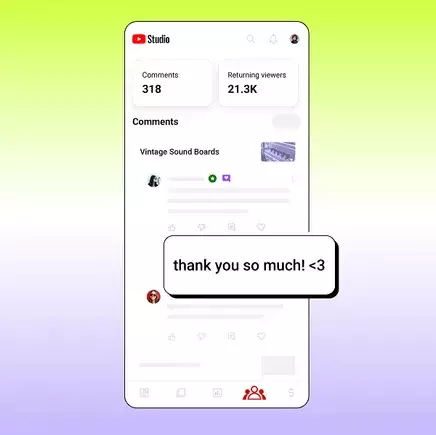In an age where digital communication is increasingly dominated by algorithms, YouTube has recently announced a live test of an AI-driven feature designed to enhance creator engagement with their audience through personalized comment replies. This initiative raises critical questions about the authenticity of social interactions on platforms that hinge on personal connection and community. While the promise of AI assistance appears appealing on the surface, it begs a deeper analysis of the implications for creators and fans alike.
YouTube’s latest endeavor offers content creators the chance to utilize AI-generated suggestions for responding to comments, creatively tailored to mimic the user’s tone and style. As articulated by the platform, this feature aims to streamline the commenting process, allowing creators to quickly reply to their viewers, especially those with substantial fan bases generating a high volume of interactions. The automated replies are designed to learn from previous engagement patterns, potentially providing streamlined responses that resonate more with the creator’s established voice.
At first glance, the utility of such a system might seem beneficial—especially to creators who find themselves inundated with comments due to their popularity. Efficiency in engagement can facilitate a quicker response time, fostering a sense of connection between creators and their audiences. However, the question that arises is whether this approach enhances genuine engagement or strips away the human touch that makes social media platforms inherently appealing.
One cannot help but notice the potential pitfalls of this technology. By encouraging the automation of responses, there’s a tangible risk that the unique voice and authenticity which many creators invest time and energy into cultivating could become diluted. The content on social media is undoubtedly rich with diversity because of the personal touches that come from human exchanges. If creators increasingly rely on AI for engagement, there’s a danger that interactions can become formulaic or, worse, insincere.
Moreover, the growing use of AI in engagement strategies moves the online landscape closer to a reality where interactions are dictated by algorithms rather than human sentiment. Critics argue that this kind of enhancement could lead to a scenario where audiences are interacting with bots rather than real individuals—a disconcerting trend that could diminish the appeal of platforms designed for social connection. The value lost in these exchanges could result in fans retreating to smaller, more intimate communities where authenticity still reigns.
There exists, however, a counterargument worth considering: the scale at which some creators operate necessitates a system that can help manage high levels of audience interaction. For many users, particularly those amassing large followings, crafting responses to numerous comments can become an overwhelming task. The desire to maintain a responsive presence is inherently tied to audience expectations, and tools that alleviate some of this pressure may be viewed as valuable aids, rather than hindrances.
Furthermore, it is undeniable that modern digital audiences expect quick responses, and a lack of engagement can lead to disconnection and decreased loyalty. For creators juggling multiple responsibilities—such as content creation, marketing, and community management—AI-generated suggestions could present a means to maintain a semblance of engagement while concentrating efforts elsewhere. The reality for many creators is that responding to fan comments is not just about maintaining connection; it is integral to building a brand and sustaining growth momentum.
A Cautious Path Forward
As YouTube rolls out this experimental feature to a select group of creators, the outcome remains to be seen. It is crucial for both the platform and its users to tread carefully along this path that intertwines technology with the intricacies of human interaction. While the allure of time-saving AI tools is undeniable, a balance must be struck. Encouraging creators to engage genuinely, without succumbing entirely to the automation trend, is vital to preserving the essential communal aspect of platforms like YouTube.
While AI may present innovative ways to tackle engagement strategies, creators, platforms, and audiences alike need to remain vigilant about the value of authentic interactions amidst increasing automation. The future of social media hangs in the balance—the challenge will be to use technology as a support rather than a substitute for genuine human connection.


Leave a Reply